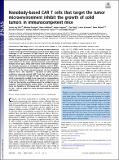| dc.contributor.author | Xie, Yushu Joy | |
| dc.contributor.author | Dougan, Michael | |
| dc.contributor.author | Jailkhani, Noor | |
| dc.contributor.author | Ingram, Jessica | |
| dc.contributor.author | Fang, Tao | |
| dc.contributor.author | Kummer, Laura | |
| dc.contributor.author | Momin, Noor | |
| dc.contributor.author | Pishesha, Novalia | |
| dc.contributor.author | Rickelt, Steffen | |
| dc.contributor.author | Hynes, Richard O. | |
| dc.contributor.author | Ploegh, Hidde | |
| dc.date.accessioned | 2020-04-30T20:18:03Z | |
| dc.date.available | 2020-04-30T20:18:03Z | |
| dc.date.issued | 2019-04 | |
| dc.date.submitted | 2019-03 | |
| dc.identifier.issn | 0027-8424 | |
| dc.identifier.issn | 1091-6490 | |
| dc.identifier.uri | https://hdl.handle.net/1721.1/124961 | |
| dc.description.abstract | Chimeric antigen receptor (CAR) T cell therapy has been successful in clinical trials against hematological cancers, but has experienced challenges in the treatment of solid tumors. One of the main difficulties lies in a paucity of tumor-specific targets that can serve as CAR recognition domains. We therefore focused on developing VHH-based, single-domain antibody (nanobody) CAR T cells that target aspects of the tumor microenvironment conserved across multiple cancer types. Many solid tumors evade immune recognition through expression of checkpoint molecules, such as PD-L1, that down-regulate the immune response. We therefore targeted CAR T cells to the tumor microenvironment via the checkpoint inhibitor PD-L1 and observed a reduction in tumor growth, resulting in improved survival. CAR T cells that target the tumor stroma and vasculature through the EIIIB+ fibronectin splice variant, which is expressed by multiple tumor types and on neovasculature, are likewise effective in delaying tumor growth. VHH-based CAR T cells can thus function as antitumor agents for multiple targets in syngeneic, immunocompetent animal models. Our results demonstrate the flexibility of VHH-based CAR T cells and the potential of CAR T cells to target the tumor microenvironment and treat solid tumors. Keywords: chimeric antigen receptor; tumor microenvironment; immunotherapy | en_US |
| dc.description.sponsorship | Lustgarten Foundation (Grant 80939) | en_US |
| dc.description.sponsorship | Howard Hughes Medical Institute (Innovator Award W81XWH-14-1-0240) | en_US |
| dc.description.sponsorship | National Institutes of Health (U.S.) (Grant P30-CA1405) | en_US |
| dc.description.sponsorship | National Cancer Institute (U.S.) (Grant P30-CA14051) | en_US |
| dc.language.iso | en | |
| dc.publisher | Proceedings of the National Academy of Sciences | en_US |
| dc.relation.isversionof | http://dx.doi.org/10.1073/pnas.1817147116 | en_US |
| dc.rights | Article is made available in accordance with the publisher's policy and may be subject to US copyright law. Please refer to the publisher's site for terms of use. | en_US |
| dc.source | PNAS | en_US |
| dc.title | Nanobody-based CAR T cells that target the tumor microenvironment inhibit the growth of solid tumors in immunocompetent mice | en_US |
| dc.type | Article | en_US |
| dc.identifier.citation | Xie, Yushu Joy et al. "Nanobody-based CAR T cells that target the tumor microenvironment inhibit the growth of solid tumors in immunocompetent mice." Proceedings of the National Academy of Sciences of the United States of America 116, 16 (April 2019): 7624-7631. © 2019 National Academy of Sciences. | en_US |
| dc.contributor.department | Massachusetts Institute of Technology. Department of Biological Engineering | en_US |
| dc.contributor.department | Massachusetts Institute of Technology. Department of Biology | en_US |
| dc.contributor.department | Koch Institute for Integrative Cancer Research at MIT | en_US |
| dc.relation.journal | Proceedings of the National Academy of Sciences of the United States of America | en_US |
| dc.eprint.version | Final published version | en_US |
| dc.type.uri | http://purl.org/eprint/type/JournalArticle | en_US |
| eprint.status | http://purl.org/eprint/status/PeerReviewed | en_US |
| dc.date.updated | 2019-12-09T18:15:48Z | |
| dspace.date.submission | 2019-12-09T18:15:51Z | |
| mit.journal.volume | 116 | en_US |
| mit.journal.issue | 16 | en_US |
| mit.metadata.status | Complete | |
